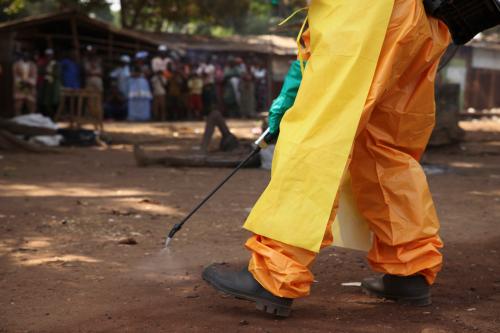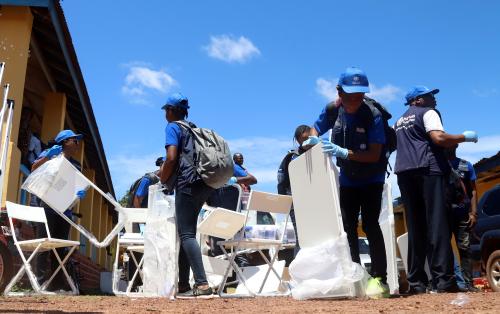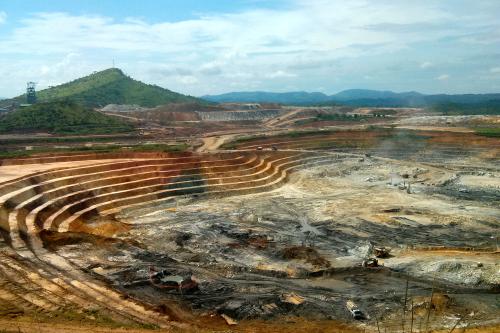Mauritius-based IHS Holding Ltd. IPO valued at almost $7 billion
On Thursday, an initial public offering (IPO) in New York of IHS Holding Ltd. shares valued the cellphone tower company at nearly $7 billion, the largest IPO of an African company in the United States. IHS’s share price opened at $21 but fell to around $17 by midday. The IPO netted IHS $378 million to fund its business development. The Mauritius-based company’s largest shareholders now include MTN, Africa’s largest mobile-phone company, and Wendel SE, a French investment firm. IHS had planned to go public in 2018, but volatile market conditions forced it—along with rival Helios Towers—to suspend its offering.
According to the African Private Equity and Venture Capital Association (AVCA), IHS’s successful IPO is part of an African investment climate that has seen large investments in other areas this year. In fact, a recent AVCA reviewing investments in the first half of 2021 indicated that Africa has raised $1.3 billion in private equity funding so far this year. According to the report, the first six months of 2021 witnessed 120 deals, whose value was concentrated in sectors like financials, consumer discretionary, industrials, and information technology. The report indicated that the strong private equity market is a factor behind rosier predictions by the International Monetary Fund regarding the continent’s immediate growth prospects. Emphasizing the importance of the findings in the report, AVCA CEO Abi Mustapha-Maduakor said, “Private capital remains fundamental towards sustained economic recovery in Africa.”
Moderna begins selection process for its African COVID-19 vaccine factory; WHO administers Ebola vaccines in eastern DRC
Following last week’s announcement that Moderna plans to invest up to $500 million to construct an mRNA COVID-19 vaccine factory in Africa, Moderna co-founder Noubar Afeyan confirmed in an interview this week that Rwanda, Senegal, and South Africa are among the candidates under consideration to host the facility. Afeyan outlined the vaccine manufacturer’s selection criteria, saying, “What matters to us most is the conditions under which we could operate. That is, the healthcare system … the presence of trained folks who can actually at least help us on some of the clinical testing that needs to be done.” Other African countries, such as Tunisia and Egypt, also boast domestic pharmaceutical industries, but have not been explicitly named as potential candidates.
In related vaccine news, the World Health Organization (WHO) began administering Ebola vaccines in eastern Democratic Republic of the Congo (DRC) on Wednesday after confirmation of the death of a young child by the disease. The WHO is importing more than 1,000 Ebola vaccines between Goma and Beni, two cities in the DRC, and plans to provide the first doses to immunize the child’s family and exposed health workers. Ebola vaccines develop an antibody response within 14 days and are reported to remain effective for up to 500 days. The United States’ Centers for Disease Control and Prevention states that “no one who was vaccinated immediately developed EVD [Ebola virus disease] 10 or more days after vaccination.” Health officials fear that an outbreak in Beni, a commercial hub and a hot spot during the 2018 Ebola epidemic, could be a catalyst for the spread of Ebola to neighboring Rwanda and Uganda. This new outbreak of Ebola emerged three years after the DRC’s devastating Ebola pandemic in 2018-2020, which killed over 2,000 people.
The International Court of Justice rules in favor of Somalia in long-term maritime dispute with Kenya
On Tuesday, October 12, the International Court of Justice (ICJ) ruled in favor of Somalia in its sea boundary dispute with neighboring Kenya. The court ruled that there was no agreed maritime boundary in force between the two countries, and instead drew a new border line similar to the border Somalia proposed. The court also ruled that there was no persuasive evidence that Kenya should pay for any previous maritime activity within the now-dedicated Somali area due to the uncertainty of boundaries while activities were ongoing.
In response to the ICJ’s decision, Somali Information Minister Osman Dubbe tweeted, “Finally we made it,” and Somali President Mohamed Abdullahi Farmaajo called on Kenya to respect the court’s decision and encouraged Kenyan officials to work to strengthen the relationship between the two countries. Kenyan President Uhuru Kenyatta has said Kenya rejects the ruling “in totality and does not recognize the findings in the decision.”
The maritime dispute between the two countries started over a disagreement about how the border extends into the Indian Ocean and came to a head in 2014 when Somalia sued Kenya at the ICJ for unlawful operations in the territory. This area, located near the Indian Ocean, is not only important for fishing; it is also rich in gas and oil. Tensions between the two had been increasing in recent months, over issues related to refugee camps, accusations that Kenya was harboring Jubbaland fugitives, and spillovers of violence from Somalia into Kenya territory.







Commentary
Africa in the news: Vaccine updates, Kenya-Somalia’s sea boundary dispute, and investment in Africa
October 16, 2021